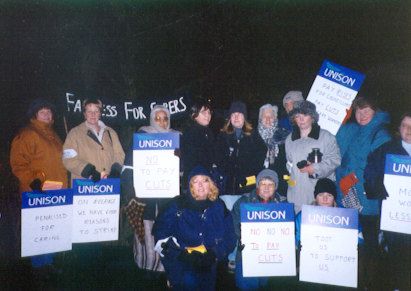LEFT COLUMN: 08.09.2000
What we think
The anti-union laws
Unshakle the unions!
In Britain, as Tony Blair has boasted, our laws are "the most restrictive on trade unions in the Western world".
On 6 September, bosses of the arms manufacturer BAe called in the police after workers defied the anti-union laws on their first day of strike action over pay. Masses of workers turned out on the picket lines in Woodford, Greater Manchester, breaking the law which says only six workers can be on a picket line. Legally, the BAe bosses were within their rights to call in the police.

Picket lines are illegal if they're effective
The day before, on 5 September, a further section of New Labour's Employment Relations Act became law, allowing workers to be accompanied in disciplinary and grievance hearings by a colleague or trade union official. This change, along with others in the Act, is supposed to give workers protection at work. But the truth is that these legal changes are so minimal that they only marginally improve our rights at work.
Trade union law is still stacked in favour of the bosses, with most of the Tory anti-union laws remaining on the books. Bosses can call the police to break up picket lines, take out court injunctions to stop industrial action, and dismiss workers for trade union activity. Our unions are shackled, and in many ways real trade unionism is only semi-legal in Britain today.
Many trade union officials welcomed New Labour's Employment Relations Act.
Singled out for praise was the increase in the amount Industrial Tribunals could pay out to sacked trade unionists. However, the special award which automatically went to those sacked for trade union activity was abolished by Labour. So, victimised UCATT activist Barbie Lindsay was awarded £4,500, rather than the £36-40,000 she would have got under the previous Tory legislation. New Labour has freed the Tribunals, allowing them to award whatever they want!
Clearly, these legal changes are no deterrent to employers who want to sack trade union activists. Barbie's case also shows that, even though the law says you can organise a ballot for union recognition, there is very little stopping the employer getting rid of the activists well before any ballot is held.
The minimum wage, which we were also told to be grateful for, is not being implemented even at the terribly low level it is currently set at. Employers are getting away with sacking people who complain about the level of pay, and others are cutting hours while increasing workloads and reducing holidays to compensate.
So the employment rights Labour claims to have introduced leave workers vulnerable to threatening bosses, and often too scared to take action in case they lose their jobs.
At its election manifesto-deciding Policy Forum on employment rights, Labour made no commitment to improve rights at work if they win a second term in office. Worse, many trade union leaders are prepared to let them get away with this.
Tony Dubbins, General Secretary of the print union, the GPMU, said: "If the different unions had demonstrated greater solidarity and togetherness then more could have been achieved."
Instead you saw the "ugly... rush of some unions to agree a package before other unions even had the chance to explore the possibilities for improvement".
The trade union movement should be fighting the anti-union laws, not allowing Labour to continue to stop us from effectively defending our members. Most union leaders seem quite content to continue to be apologists for New Labour. We need less hot air and more official support for campaigns which demand better union rights and better rights at work.
We urge visitors to our website to become involved in the Reclaim Our Rights campaign - an initiative already backed by 10 national unions and hundreds of local affiliates. They are demanding the repeal of all the anti-trade union laws and calling for the following positive set of rights:
- The establishment of the right to take lawful industrial action in support of the employees of different employers;
- The broadening of the definition of a trade dispute to include action to protest against the social, economic or educational policies of governments;
- The end of state interference in balloting, including the specifying of fully postal ballots and the requirement for notice periods;
- The establishment of the right to strike without fear of dismissal;
- Statutory employment protection rights to apply from day one.
The trade union movement must actively campaigning around these demands - a first, important and vital step would be calling a national demonstration on these demands - while taking the action necessary in the here and now to defend our members' jobs and conditions.
